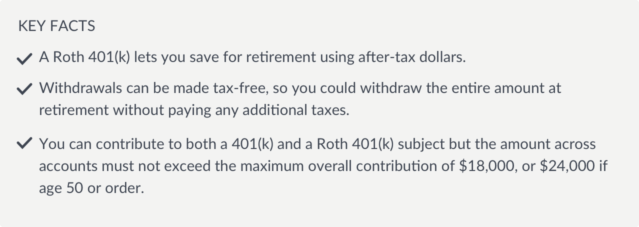What is a Roth 401(k)?
A Roth 401(k) is similar to a traditional 401(k) but with one major difference: it permits you to make contributions on an after-tax basis. Because you have already paid taxes on your contributions, withdrawals are tax free at retirement, subject to certain conditions.
Roth 401(k): The Basics
The Roth 401(k) combines the best features of both the Roth IRA and a traditional 401(k) plan. Participants contribute a proportion of their paycheck on an after-tax basis. But if certain conditions are met, withdrawals are 100% free from federal income tax. In addition, there are no income limits, so anyone can participate in a Roth 401(k) regardless of their income level. Employers who offer 401(k)s can choose whether to offer the Roth option, and not all of them do. So be sure to check with your employer if Roth contributions are available in your plan.
How Much Can I Contribute to a Roth 401(k)?
Roth 401(k) plans are subject to the same annual contribution limits as regular 401(k) plans – $18,000 or $24,000 for those age 50 and over. This is an overall cap on your combined contributions across all of your 401(k) plans; you don’t get to contribute twice as much money if you participate in both a traditional and a Roth 401(k).
Are Roth 401(k) Distributions Really Tax-Free?
Because you’ve already paid taxes on your Roth 401(k) contributions, you won’t pay taxes when they’re distributed from the plan as long as:
- The distribution is made after the end of a five-year waiting period, starting with the year you make your first Roth contribution to your employer’s 401(k) plan.
- The payment is made after you turn 59.5, become disabled, or to your beneficiary upon your death.
If you make a withdrawal in any other circumstances, the investment earnings portion of your distribution will be taxable, and will also be subject to a 10% early distribution penalty if you are under age 59 ½.
Employer contributions are a little different. Since these are always paid on a pre-tax basis, your employer’s contributions will be placed in a separate traditional 401(k) account and taxed at withdrawal.
What About Rollovers?
If your employment terminates before you meet the criteria for a qualified distribution, you can avoid taxation by rolling your distribution over into another employer’s 401(k) Roth plan or to a Roth IRA. You are not permitted to rollover Roth 401(k) distributions into a traditional 401(k) or IRA and vice versa.
Why Not Just Choose a Roth IRA?
The Roth IRA is also an after-tax program and can achieve some of the same goals. However, it restricts investors with high income from participating. Currently, you can only contribute to a Roth IRA if your annual income is below $132,000 (single) or $194,000 (married and filing jointly).
The other point to note is that Roth 401(k) participants have to take required minimum distributions at age 70.5, whereas Roth IRA participants do not. This may make the Roth 401(k) less attractive for investors who might not need to use the money in their retirement and would prefer to pass their savings to their heirs.
The good news is, your participation in a Roth 401(k) does not affect your eligibility to contribute to a Roth IRA. Currently, you can contribute up to $5,500 to a Roth IRA ($6,500 if you’re aged 50 or older) assuming you meet income requirements, in addition to your Roth 401(k) contributions.
Disclosure
Nothing in this article should be construed as tax advice, a solicitation or offer, or recommendation, to buy or sell any security. This article is not intended as investment advice, and Wealthfront does not represent in any manner that the circumstances described herein will result in any particular outcome. Financial advisory services are only provided to investors who become Wealthfront clients.
This article is not intended as tax advice, and Wealthfront does not represent in any manner that the outcomes described herein will result in any particular tax consequence. Prospective investors should confer with their personal tax advisors regarding the tax consequences based on their particular circumstances. Wealthfront assumes no responsibility for the tax consequences to any investor of any transaction. Investors and their personal tax advisors are responsible for how the transactions in an account are reported to the IRS or any other taxing authority.
